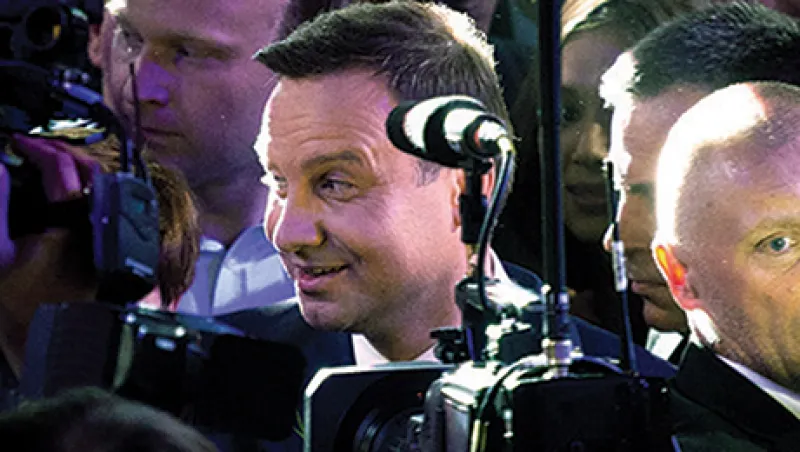Despite having the ills of the euro zone to the west and the political quagmire of Ukraine to the east, Poland has remained a rare success story among emerging markets. For that reason, new President Andrzej Duda thinks it’s better off saying no to joining the euro.
Kraków native Duda rode to victory in May on the back of campaign promises to pull Poland out of the “mainstream” of the European Union and seek to return sovereignty to member states. Youthful yet conservative, the 43-year-old is the country’s first leader to come of age after the fall of the Iron Curtain. Since taking office on August 5, he has hewed closely to his Law and Justice party’s right-wing, euroskeptic agenda. For the foreseeable future Duda and most of his compatriots are content to stick with their own currency, the zloty, even though EU members are obliged to adopt the euro.
“I think that ultimately there should be a referendum on this issue after a thorough debate,” Duda said on September 8 at an economic conference nicknamed the Eastern Davos, in the southern Polish spa town of Krynica-Zdrój.
If Law and Justice prevails in the parliamentary elections on October 25, as current polls project, don’t expect Poland to make a big push to join the euro zone anytime soon. On the campaign trail this past summer, Duda’s waspish stumping points included the argument that such a move shouldn’t take place until Poland’s wages are in line with those of Germany, its western neighbor.
A decade ago accession to the euro zone was considered the ultimate stamp of approval for many of the EU’s new members from Central and Eastern Europe. Today, Poland isn’t sold on the idea: A European Commission poll published in April showed that 53 percent of its citizens don’t want the single currency. In the 11 years since the country joined the EU, it’s had a front-row seat on the contagion that crept through the currency bloc during the 2008–’09 recession. The Greek crisis earlier this year helped keep those memories fresh in Poland’s economic psyche.
“In the long term — say, in a hundred years — I think it would be beneficial for Poland to join the euro,” says Binqi Liu, a portfolio manager with the emerging-markets debt team at HSBC Holdings in London. “But in the short term I can understand why they scrapped this plan,” she adds. Poland has the luxury of controlling its own monetary policy while also enjoying the liquidity of ultralow interest rates, given its closeness to and deep trade links with the euro zone, Liu explains.
The onetime Communist nation has seen its economy expand by 37 percent since 2007, including positive growth during the 2008–’09 financial crisis; the euro zone’s economy grew by just 2 percent during the same period. Since breaking free from the Soviet Union’s sphere of influence in 1989, Poland has more than doubled its per capita gross domestic product, to $24,882 last year in purchasing power parity terms, according to Marcin Piatkowski, a World Bank Group senior economist based in Warsaw. The Paris-based Organization for Economic Cooperation and Development, which Poland joined in 1996, rates it as a high-income nation. Still, Polish income levels remain at 65 to 70 percent of those in Western Europe.
Aiming to achieve wage parity with Germany, the euro zone’s largest economy, isn’t a bad idea. For Duda, though, there’s more than a bit of patriotism in that sentiment. His hometown, the onetime seat of the Kingdom of Poland, looks like a scene from a fairy tale. In the center of Kraków, Wawel Castle floats atop a hill, overlooking the thousand-year-old Church of St. Adalbert and Duda’s alma mater, Jagiellonian University, founded in 1364 by King Casimir the III. All of the people whom Duda has named as personal heroes are Polish: Pope John Paul II, former president Lech Kaczynski (identical twin of Jaroslaw Kaczynski, ex–prime minister and the co-founder and present chair of Law and Justice) and members of the resistance in the 1944 Warsaw uprising against the Germans.
In an August interview with news website Politico, Duda said that “wartime sensitivities are always present” between Poland and Germany and that the latter should be sensitive to Poland’s “interests, our point of view.”
Duda has criticized a Germany-led quota program for taking in refugees from the Middle East, calling it a threat to national sovereignty. For its part Poland has agreed to accept some 2,000 immigrants. Duda contends that quotas will lead to a “vicious circle” by attracting even more people seeking safe harbor. At the same time, he’s mentioned a desire to bring in ethnic Poles from the former Soviet Union. The new Polish president, the son of professors at a mining institute, also resents EU decarbonization initiatives. Poland, Europe’s No. 2 coal mining country after Germany, derives about 75 percent of its electric power from the fossil fuel.
For all of its nationalistic bluster, though, Poland is still an emerging economy that needs EU support. The top beneficiary of the union’s structural funds, it’s on track to receive €77.6 billion ($86.4 billion) from Brussels from 2014 through 2020. The biggest contributor to those funds? Germany, where many Poles have fled to find work since their country joined the EU, putting aside any wartime sensitivities they might have.
Get more on emerging markets .
Follow Anne Szustek on Twitter at @the59thStBridge.






